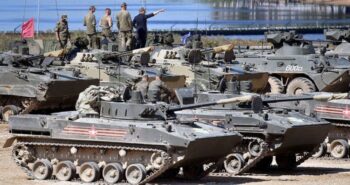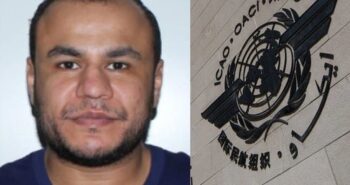By Anthony Loyd
 In the days before they died, the Libyan family of five scavenged for grass and tree bark to eat to survive. Like the other civilians trapped alongside them in the besieged Benghazi neighbourhood, the Hamzas drank rainwater from puddles as airstrikes rained around them.
In the days before they died, the Libyan family of five scavenged for grass and tree bark to eat to survive. Like the other civilians trapped alongside them in the besieged Benghazi neighbourhood, the Hamzas drank rainwater from puddles as airstrikes rained around them.
Weak with hunger after months of encirclement by the forces of Marshal Khalifa Haftar, they spoke rarely and when they did their voices were thin and listless. Journeys of the shortest distance became laborious ordeals and they frequently stumbled and fell.
Eventually, having endured so much, all were killed. Aalya Hamza, 75, the family matriarch, was last to die, machine-gunned by the Libyan National Army (LNA) beside two of her children as she tried to escape. Their bodies have no known grave, and their killers — if they gave the family’s deaths any thought at all — would surely have assumed that there the matter would end.
Yet on Thursday night, over three years after they were slain, the details of the Hamzas’ deaths have risen again in an American lawsuit against the Libyan warlord by relatives of two destroyed families for $50 million dollars in damages.
The case, filed in a Virginia federal court by leading British and American lawyers, who have previously brought lawsuits against the Real IRA, could have far-reaching consequences for Marshal Haftar, threatening his financial security after a summer of battlefield reverses in Libya.
The 76-year-old warlord is vulnerable to legal actions brought under the Alien Tort Statute in the US, which allows foreigners to litigate against Americans for violations of international law. As a dual American-Libyan citizen with extensive financial assets in Virginia including a home, an 85-acre estate and property investments of at least $8.5 million, Marshal Haftar can be sued in an American federal court by Libyans.
“The main purpose of the case is vindicatory,” said Matthew Jury, managing partner of London-based McCue & Partners, who is representing the Hamza family with two American lawyers.
“Compensation is always secondary or tertiary — you can’t put a price on the life of a family. The plaintiffs want to bring what is happening in Libya to light, to use the case as a platform.”
Nevertheless, if he loses the case, the marshal could find not only that his financial security in the US is removed, but that his murky foreign assets fall under investigation too.
“Haftar’s Virginia assets could be enforced against and distributed among the claimants if they win,” Mr Jury explained. “But there could also be a search for Haftar’s international assets.
If his assets were to be frozen or seized then that would have an impact. A civil case against him, if successful for war crimes — would apply impetus for the US to seek an extradition.”
Marshal Haftar is already the subject of at least three civil cases in America by Libyans lacking any route to justice in their own country’s courts. However, the case filed against him on Thursday presents a particular threat to the warlord, not least because of the lawyers involved.
Mr Jury acted for the families of the 29 victims in the landmark civil action brought against the Real IRA members responsible for the 1998 Omagh bombing, and most recently led the successful civil proceedings against the IRA Hyde Park bomber, John Downey. He is also acting in a case against one of the chief suspects in WPC Yvonne Fletcher’s murder, Saleh Ibrahim Mabrouk, a Libyan.
His US counterparts are similarly heavyweight, with Mark Zaid already a prominent attorney before he represented the whistleblower whose complaint against President Trump resulted in the 2019 impeachment inquiry against him.
Accused of multiple counts of violations of international law, including overseeing extrajudicial killings and crimes against humanity, the litigation case against Marshal Haftar originates in his eight-month-long siege of the Ganfouda neighbourhood in Benghazi between August 2016 and March 2017, where his forces surrounded Islamist militants including members of Ansar al-Shariah, the terrorist group that carried out the 2012 attack on American personnel in Benghazi.
Trapped alongside the militants were hundreds of civilians who were prevented from leaving the siege by the LNA despite repeated requests by the UN and humanitarian groups.
Among them were the Hamzas and the family of Salimah Jibreel, who was to lose three children between the ages of 3 and 11, and became the second plaintiff in the case alongside Ali Hamza, a survivor of his family.
Both families had fled fighting elsewhere, and by the autumn of 2016 found themselves sheltering in Ganfouda among ruins and under bombardment by the LNA without medical care, fresh food or running water.
“In one call in December 2016 my brother Mahmoud told me that if they had not found weeds to eat they had begun to stumble and fall with hunger,” said Mr Hamza, a Libyan-Canadian who maintained irregular phone contact from Canada with his besieged mother and adult siblings in Ganfouda in the final months of their life. “As time went on even their voices became weak.”
In February 2017, his brother Ibrahim was killed by an LNA tank shell. Two days later his sister Fariha had her leg blown off by artillery fire. The family tried to fix the stump using sticks to splint the exposed bones, but she died two days later.
Three weeks later the three surviving members tried to flee Ganfouda. All were shot and killed by the LNA. Mr Hamza learnt of their deaths on a Facebook page, which showed photos of their bodies lying in the rubble. It is not known if or where they were buried.
“I had even sent Haftar a written letter pleading with him to evacuate the civilians from Ganfouda,” Mr Hamza recalled yesterday hours before his case was filed in Virginia. “But he never even replied.”
Despite widespread knowledge of atrocities by the LNA, Marshal Haftar is yet to face any serious repercussions for the accusations of war crimes.
One of his commanders, Mahmoud al-Werfalli, has been indicted by the International Criminal Court for murdering 33 detainees in Benghazi, yet Marshal Haftar has made no effort to have Werfalli extradited and his own travel arrangements remained unimpeded.
“Haftar isn’t under any sanction by the EU, the [UN] security council or the US and is free to travel and meet who he wants,” Hanan Salah, senior Libyan researcher for Human Rights Watch, said.
“Despite never handing over one of his commanders wanted by the ICC, Haftar has been able to travel to Berlin, Palermo, Paris and Abu Dhabi, apparently without losing a single political point.”
Indeed, despite the impression that Marshal Haftar may have been marginalised by his international backers after his summer losses, a confidential report presented to the UN on Friday listed large-scale military support by his principal backers: Russia, Egypt and the UAE.
Investigators counted 339 Russian military flights landing in areas controlled by the LNA in Libya in the eight-month period until July, mostly from Khmeimim air base in Syria.
The plaintiffs in the new case against Marshal Haftar, however, fuelled by the memories of their slain relatives, say they are seeking an outcome beyond money or politics.
“It’s not about the money, it’s about revealing a truth. My mum saw her daughters and sons killed, and then was herself killed after living in terrible conditions,” Mr Hamza said yesterday. “They were not alone.
They were trapped in a place where civilians were killed without care, where people were going mental under the strain. If Haftar isn’t revealed as a murderer, as a vicious killer of elderly women and children, then justice is deficient.”
The Times
***********
Khalifa Haftar sued in US court for $50m over alleged rights abuses, war crimes
By Umar A Farooq
 Two individuals say forces under Haftar’s command were responsible for deaths of family members in Benghazi.
Two individuals say forces under Haftar’s command were responsible for deaths of family members in Benghazi.
Two Libyan families are suing Khalifa Haftar for alleged war crimes in a US court, accusing the US national of murder and a starvation siege that forced civilians in a Benghazi neighbourhood to eat grass and tree bark.
The claim was filed on Thursday in the district court of eastern Virginia by two relatives of Haftar’s alleged victims, Ali Abdalla Hamza and Salimah Jibreel, who say that the commander of the self-styled Libyan National Army (LNA) is responsible for the deaths of their family members.
The lawsuit focuses on the LNA’s siege of Benghazi in 2016, particularly the district of Ganfouda, where repeated air strikes by Haftar’s forces pinned down hundreds of civilians.
Hamza says he had to flee his home in the area after it was bombarded and looted.
His wife, Aalya, his two brothers, Ibrahim and Naser, and his three sisters, Fariha, Faiza, and Abtisam, took shelter in an unoccupied apartment in the suburb of Ganfouda, where they ate tree bark and grass and drank water from puddles in order to survive.
The case states that the Hamza family members became so weak that they could barely walk, and there was repeated artillery and aerial bombing attacks all around them.
“The combination of the engulfing dust from the bombing attacks and starvation caused them to experience temporary blindness,” the suit said.
During multiple tank-shell attacks in February 2017, LNA soldiers killed Hamza’s brother Ibrahim and his sister Fariha.
In the case of Jibreel, she claims she saw her three-year-old daughter Aziza, eight-year-old daughter Maryam, and 11-year-old son Mohammad killed on 18 March 2017 when an LNA shell hit their house.
Her sole surviving daughter was injured, as was her husband, Alaa, who has since been detained by LNA forces and is still being held incommunicado.
Thursday’s lawsuit demands Haftar pay $40m in compensation to Hamza’s family and $10.5m to Jibreel’s family.
Haftar cannot claim ‘sovereign immunity’
While US courts accept civil claims by American citizens seeking compensation for acts of terrorism by foreign powers, the Torture Victim Protection Act of 1991 allows for non-US citizens to do so against individuals who, acting in an official capacity for any foreign nation, have allegedly committed torture or extrajudicial killing.
The law is aimed at perpetrators of torture who are acting under apparent government authority.
After Haftar failed in a coup attempt against Libyan leader Muammar Gaddafi in 1987, he arrived in the US for protection, and eventually became an American citizen.
Haftar’s family, including his sons Khalid and Saddam, settled in northern Virginia, where they reportedly bought a total of 17 properties, including an 85-acre estate in Keysville, Virginia.
In 2011, when Gaddafi was overthrown by rebels and later killed, Haftar returned to Libya and served as the head of the military for Libya’s internationally recognised government, the Government of National Accord (GNA).
He has since turned on Tripoli, accusing the UN-recognised government of being a safe haven for armed groups and militias.
His forces are fighting the interim government with the backing of Egypt, the United Arab Emirates and Russian mercenaries.
Two other Libyan families had filed a similar lawsuit against Haftar in February, alleging that forces loyal to the eastern military commander tortured their family members to death.
Haftar initially did not respond to the suit, but after facing the possibility of a default judgment, he hired lawyers to defend himself. His legal team claims the Libyan commander is immune from prosecution since he should be treated as a head of state.
However, Thursday’s claim says Haftar cannot “rely on any invocation of sovereign immunity as he is not recognized as a head of state”.
Instead, the lawsuit argues that he is subordinate to the Tobruk-based House of Representatives.
***
Umar Farooq is a journalist based in Washington DC. He writes about social and political issues facing Muslim communities in the US, as well as foreign policy related to the Middle East.
___________





